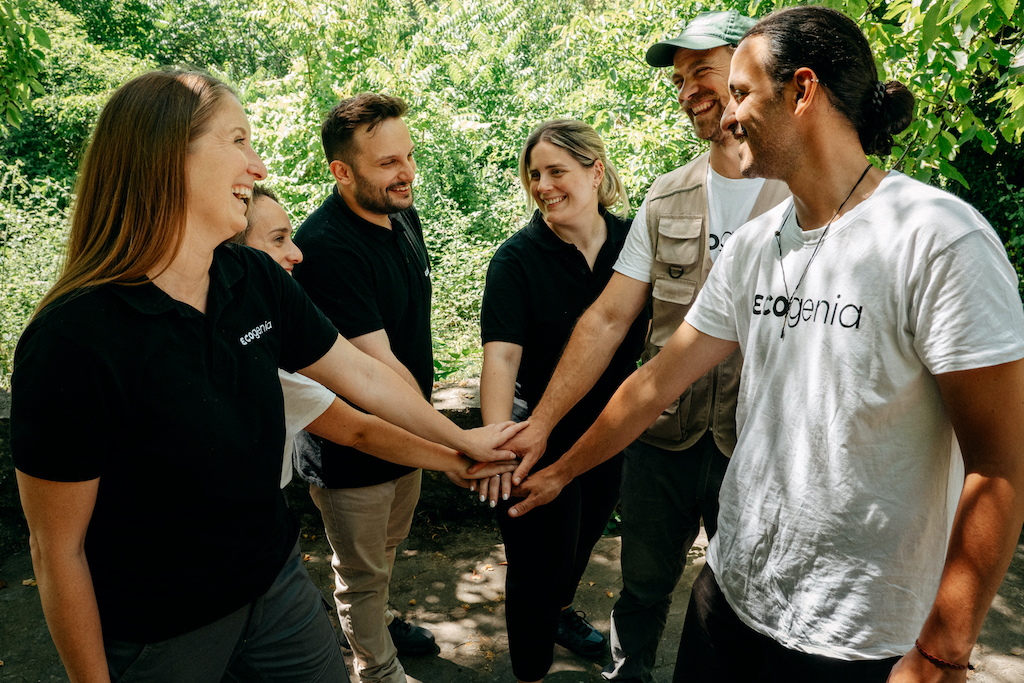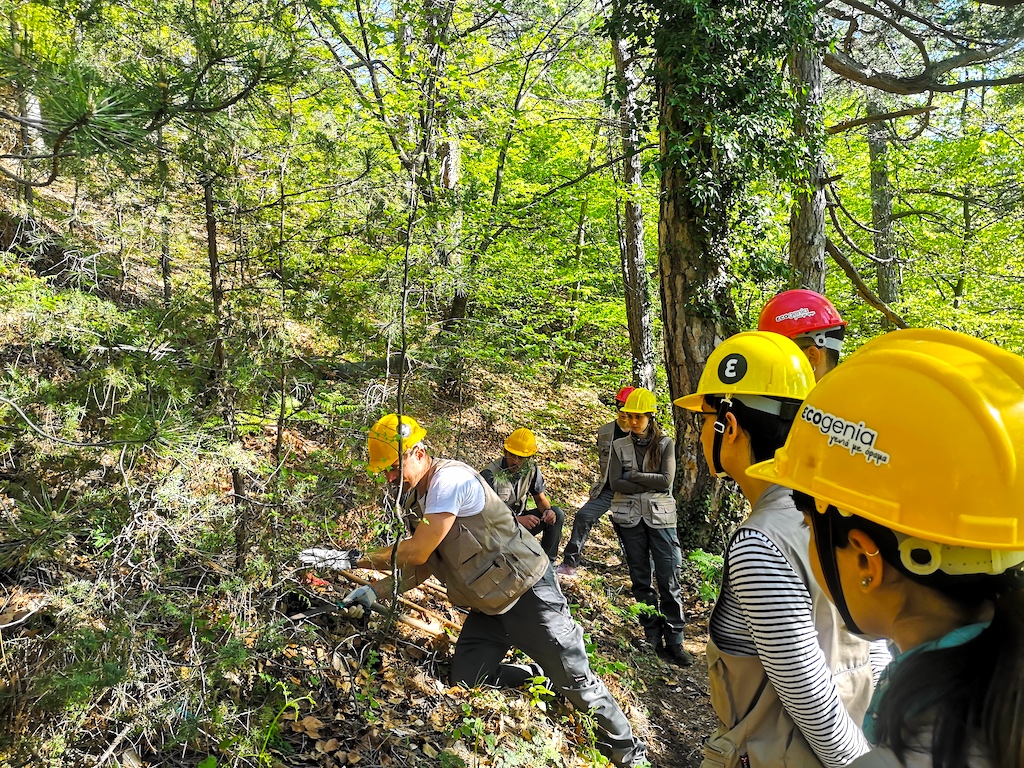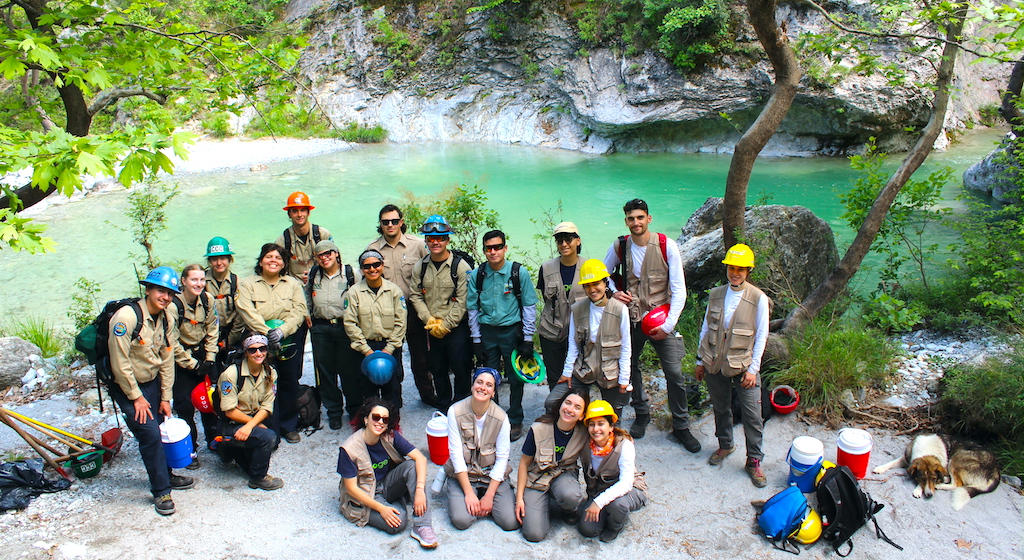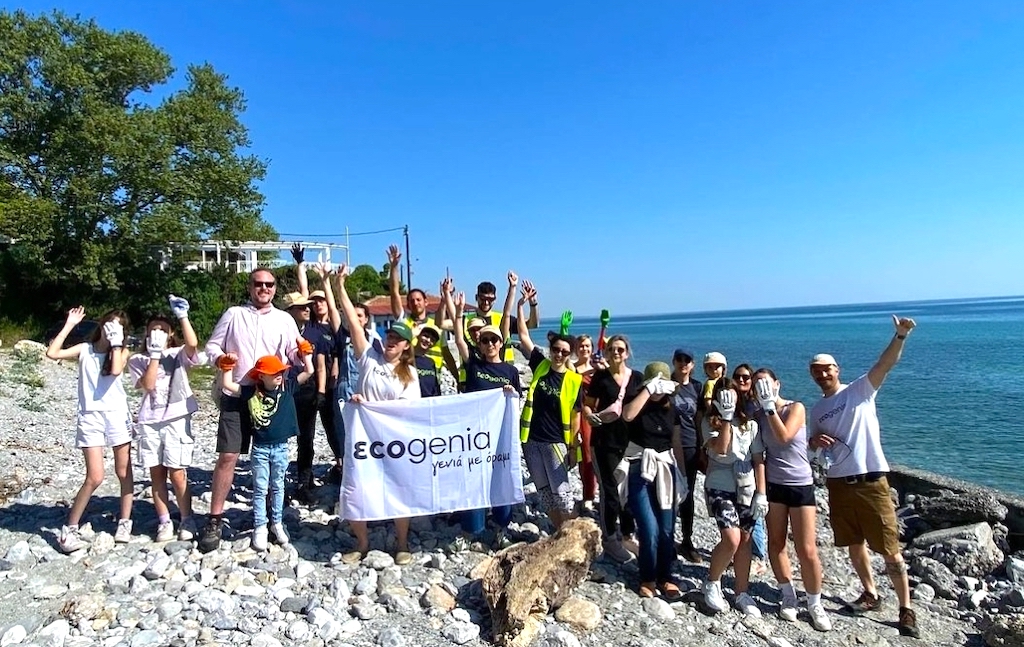We’ve heard lots about climate change and the climate crisis and Greece is very much experiencing both while sadly lacking in most cases a plan and preventative measures.
The devastating fires in the past years, with the latest last month reaching into Athens’ suburbs, and the resulting floods in Central Greece, have made the need for consistent climate action all the more urgent.
Leading the charge for change is Ecogenia, a group of visionary youths working to build a national climate corps in Greece inspired by successful civic service models like AmeriCorps (US), Unis-Cite (France), and the California Conservation Corps.
To Vima English Edition spoke with Greek-American Lia Papazoglou, who together with Erika Spagakou cofounded Ecogenia during the pandemic. In this short time, Ecogenia has gone from a handful of dreamers to an influential organization that will be participating in the Clinton Global Initiative (CGI) 2024 next week as the only Greek organization in the CGI’s global cohort of Commitment Makers.
And their work doesn’t stop there. On Sept. 26, Ecogenia will be spreading the word about civic action in Greece during Climate Week NYC in New York City, the largest annual event highlighting global climate initiatives.
The non-profit has also completed four pilot projects so far in three regions across Greece, contributed over 14,000 hours of community service, participated in the Athens Democracy Forum, and in the Our Ocean Conference.
The group’s biggest achievement, however, is seeing the Ecogenia family grow. “We have a big vision for Greece and in our startup phase, it takes a lot of passion, time, and grit to get all of the work done,” Papazoglou tells To Vima English Edition. “We’ve managed to move mountains in a very short period of time thanks to the dedication of the Ecogenia team.
In short, Ecogenia’s mission is to motivate youths to participate in climate action projects in Greece through a civic service model, which means that young people aged 18 to 30 can receive special training, hands-on experience, get paid, and meet new friends while giving back to their communities and to future generations.
Civic Service a Win-win for Greece

Papazoglou’s vision for Ecogenia was born from her own experience in AmeriCorps, which she joined after graduating in the midst of the U.S. financial crisis in 2009. AmeriCorps was a “transformative experience”, she says, giving her the chance to work on meaningful community projects while earning a salary.
Her experience at AmeriCorps made her wonder if a similar model could work for young Greeks, who, due to the financial crisis, were leaving Greece in search of better opportunities abroad. “The solution seemed clear: create opportunities for young Greeks to stay in Greece through civic service programs,” Papazoglou tells To Vima English Edition.
“Young people will gain critical experience while getting paid in addition to the impact of their work directly benefiting local communities which desperately need the extra support. It’s a win-win,” she says.
It took Papazoglou a Masters in Sustainable Development and work experience in the climate and renewable energy sectors to set up Ecogenia a decade later. “Building a civic service program in Greece would definitely need to focus on climate action, the defining challenge of our time, while better equipping the younger generation with the necessary skills and mindset for the green transition.”
Challenges: Funding & Trust

Civic climate action in Greece on the spot. Photo credit: Ecogenia
Securing funding and gaining public trust are the biggest challenges so far, says Papazoglou. Long-term financial support is essential to sustaining the organization’s work, but climate action projects often struggle as short-term projects take priority.
“It’s a global challenge to find funding for climate action work. The impact is seen in the long term, making it easy to deprioritize in favor of more immediate projects,” she explains.
Another hurdle is building public trust. “Civil society organizations in Greece do not have a positive reputation, mostly due to incidents of mismanagement over the last two decades,” she adds.
Committed to transparency, Ecogenia holds open information sessions for the public before starting projects and makes all financial reports available on its website.
Ecogenia currently secures funds through support from foundations, corporate partnerships, European projects, and individual donors. But as the organization scales, Papazoglou hopes to attract public-private partnerships to unlock larger funding streams.
“Ecogenia can provide a trained and motivated workforce for the country to effectively address and combat the climate crisis; we just need to identify the pipeline of funding that can support this work in the long-term.”
And the effects, she adds, are multifold: supporting economic development as young people are paid for their service term while helping reduce youth unemployment; it also puts money back into the community thanks to participants’ spending power; it strengthens social cohesion bringing together diverse groups of young people on projects; and it nurtures a climate-minded workforce and engaged community.
From Vision to Action

The proud Ecogenia team after a hard day’s work and learning. Photo credit: Ecogenia
I had the chance to meet Lia and her team during the 1st Olympus Adrenaline & Nature Festival, which took place in Litochoro earlier this year. She now lives in Pieria, at the foot of Mt. Olympus, where she cooperates with local stakeholders to design service projects that align with community needs. “Mt. Olympus is both symbolic and practical. As Greece’s first and largest national park, it needs significant environmental protection and wildfire management initiatives,” she explains.
The Dion-Olympus Μunicipality and the local forestry department have welcomed Ecogenia’s work, eager to have youth service teams support their efforts. Papazoglou hopes the Mt. Olympus project will set the foundations for Greece’s national climate corps and serve as an example of what civic service can achieve for the country.
Meanwhile, aiming to measure the impact of its work, Ecogenia administers surveys to collect data for its projects, the results of which are presented in impact reports available online. It also conducts a Social Return on Investment (SROI) analysis to quantify the community value of its work. Citing AmeriCorps data, $1 invested in civic action generates approximately a $4 return for the community. Ecogenia hopes to replicate this model in Greece.
Engaging the Next Generation

Beach cleanups too! Photo credit: Ecogenia
The organization recruits young people from diverse backgrounds across Greece and engages volunteers of all ages, including students and tourists. One of the program’s participants, 27-year-old law student Sofia Siwka, a Pieria native, found Ecogenia through social media. “I wanted to do something meaningful, give back to my community, and make a difference,” she tells To Vima English Edition.
Another participant, 28-year-old Anthi Paschalidou, a geologist from Thessaloniki, sees civic service as a great opportunity to gain and share skills in a rewarding way while meeting new people.
Ecogenia has also hosted study abroad programs, as well as volunteers from Google and the U.S. Embassy. Moving forward, the organization aims to build a more structured volunteer scheme and increase its engagement with student groups globally.
* Readers interested in getting involved or supporting Ecogenia can join the corps, make a donation, become an ambassador, or volunteer in the field.



